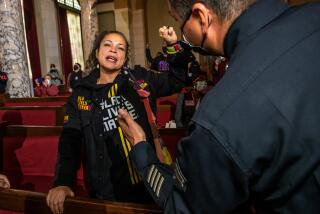Supreme Court confronts case of mentally ill suspect shot by police
- Share via
Reporting from Washington — The Supreme Court confronted a situation Monday that’s all too common in law enforcement: A mentally ill woman was shot by police officers who tried to arrest her.
But after an hour of argument, the justices, who initially had seemed attracted to the case by a novel legal question, appeared to be heading toward sending it back to a lower court for a jury to sort out.
The case involves a San Francisco woman, Teresa Sheehan, who was shot five times after two police officers entered her room at a group home.
When the officers first entered Sheehan’s room, responding to a report by a social worker who said the woman was disturbed, Sheehan grabbed a knife and told them to leave. They waited in the hall outside the apartment door for a few minutes then forced their way back in. When Sheehan came toward one female officer, she fired five shots.
Sheehan survived and sued the officers for breaking into her home without a search warrant. The 9th Circuit Court of Appeals last year said her suit could go to trial.
In addition to suing for a violation of her rights under the 4th Amendment, the appeals court said, Sheehan could also sue the police under the Americans with Disabilities Act. The officers had failed to make a reasonable accommodation for her mental disability, the appeals court ruled.
That latter claim caught the high court’s attention. The justices had not ruled squarely on whether police were covered by the anti-discrimination law.
But in the opening moment of Monday’s argument, Justice Antonin Scalia said the case should be dismissed because even the San Francisco city attorney who had filed the appeal agreed the police were bound by the ADA in at least some circumstances.
“It’s called a bait and switch,” Scalia told Christine Van Aken, a deputy city attorney, before she could begin her argument.
The lawyer fought back, arguing that the disability discrimination law applied generally, but not when an officer tries to arrest an “armed and violent individual.” The officers believed that Sheehan, brandishing a large knife, was a danger to herself and others, she said.
Justice Sonia Sotomayor said this belief would not justify breaking into the woman’s apartment a second time after an angry Sheehan had chased them out once.
“They could have waited and tried to talk her out,” she said.
An attorney representing Sheehan said the case involved a “factual dispute” that should be decided by a jury, not by the high court.
“Exactly,” Scalia said. “I don’t know why we took this case.”
By the end of hour-long argument in San Francisco vs. Sheehan, the justices hinted they may well send the case back for a decision by a jury. Two questions would be at issue. Did the two officers violate the 4th Amendment’s ban on “unreasonable searches and seizures” when they forced their way back into Sheehan’s apartment? And did they violate the ADA by provoking a violent confrontation with a mentally ill woman who did not represent a danger to the public?
Leonard Feldman, the attorney for Sheehan, said his client did not present a “direct threat” to the officers or the public. She was living in a group home and kept to her own room, he said.
“The entire risk here was avoidable,” he said.
The attorney for San Francisco said the officers had no choice but to try to arrest the woman. The social worker who initially reported Sheehan said she had threatened him when he tried to visit her. He told police the woman had quit taking her medication and should be taken to a hospital for treatment.
“At some point, someone was going to have to back in that room,” Van Aken said.
The case had drawn attention because of the many instances in which police try to arrest suspects who are violent and mentally ill.
In most instances, judges have said, officers cannot be sued if an arrest provokes a violent confrontation. U.S. District Judge Charles Breyer, the younger brother of Justice Stephen Breyer, initially dismissed Sheehan’s suit against the two officers.
But the 9th Circuit said the law did not shield the police from facing a jury in a case such as this.
Justice Breyer was absent for Monday’s argument, and his eight colleagues will determine soon whether to decide the case or send it back to the jury.
For more on the Supreme Court, follow @DavidGSavage on Twitter
More to Read
Sign up for Essential California
The most important California stories and recommendations in your inbox every morning.
You may occasionally receive promotional content from the Los Angeles Times.











